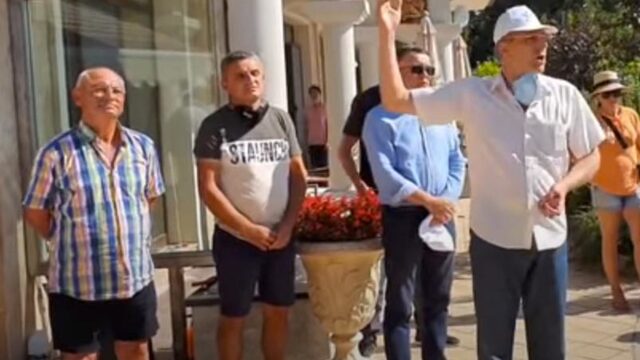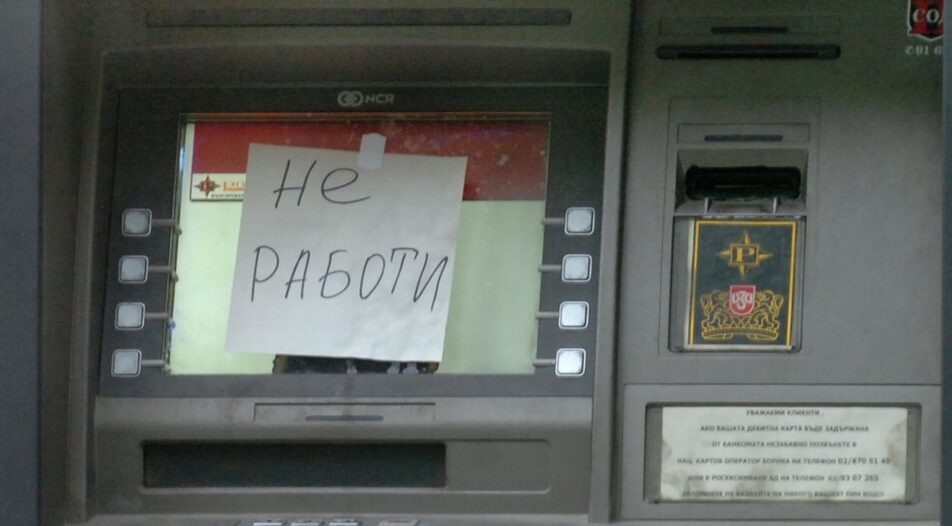So here's a question: why do Bulgarians hate online banking? Fact is - to judge from the latest Eurostat yearbook, most Bulgarian regions rank last in the EU in terms of people using this financial service.
Specifically, the NorthEast ranks lowest in the whole union by that measure. Bulgaria is on a par with the remotest Turkish provinces, the south of Italy and Romania in terms of online banking use. While 58% of the population use it on average in the EU, only 13% in Bulgaria do so.
Now, there can be lots of explanations. First, income levels are still very low here compared to the EU average. Second, Bulgaria has a very high percentage of older people, over 65, who are generally more wary of using ANY type of banking (Bulgaria experienced a massive run on the banks and hyperinflation in the 90s, which hit savings).
But this might also point to bigger deficiencies.
Many Bulgarian workers (in innumerable sectors) receive unofficial payments - in an envelope, or under the table, because it's cheaper for their employers. It reduces their social benefits and pension but means more money in the pocket more often than not - because the money can't be officially accounted for. This black economy still rules in many places outside Sofia.
Many people simply don't trust the authorities and don't want to use banks, or online banking, because they fear they will either be robbed, or the government will check on them. The latter can also be used quite handily to explain the skepticism towards vaccines (coupled with superstition, as this article brilliantly explains).
So here's some advice. Always take financial statistics in Bulgaria with a hefty pinch of salt - and even pepper! Things are rarely as they seem in this land of wonders. (as to why you should always take rankings with the same attitude, look further down for Kristalina Georgieva)
This week's newsletter is helped by Martin Dimitrov
POLITICS THIS WEEK
Envelope workers
Lest we forget - while we're on the subject of the black economy, the sector most widely represented there protested this week in front of the Presidency. Construction workers, bussed in by their companies, demanded payment for road-works.
The catch: the works were ordered by the last government which didn't provide any money for it, and emptied the coffers preemptively.
It is as easily understandable why companies from the most government-dependent sector are nostalgic for the asphalt-crazy GERB functionaires, as it is why the former love a sector that offers huge procurements and kickbacks.
Out with the old, in with the
This week marked the first time in recent history that a caretaker government handed power to a caretaker government. It happened on Thursday when the going-out PM Stefan Yanev greeted incoming PM Stefan Yanev.
Most of the caretaker ministers keep their places.
The three new faces are people with some experience of high office - Hristo Aleksiev, the new Transport Minister comes from the Railway Infrastructure State Company, Finance Minister Valery Belchev presided over the Fund of Funds during the second Borissov cabinet while Daniela Vezieva who now leads the Economy Ministry, was a deputy in the same institution during the same period.
It's not about who is in, it's about who is out
The distinguished absentees from the list are ex-Finance and Economy Ministers Assen Vassilev and Kiril Petkov. As we have so often predicted, they are planning to ride their current wave of popularity by launching their own political faction.
The movement (rumoured to be called Promianata Prodalzhava, standing for "The change continues") is already geared up to take part in the upcoming November election.
"We believe in attaining left-wing goals with right-wing instruments, such as keeping taxes low, and eliminating corruption. This will lead to prosperity and higher incomes for pensioners, better education and healthcare," Mr Petkov said on Thursday, while announcing their still murky plan.
The salient fact: they currently enjoy quite high ratings - in the low 40 % - which renders them a rather intimidating force.
And is the change really still happening: two examples
Both come from the last days of Parliament. Even though the status-quo parties - GERB and Turkish MRF - abstained and tried to sabotage the vote, the MPs managed to pass a long-awaited and hard-fought piece of legislation that symbolically hit Prosecutor General Ivan Geshev. The notorious Bureau for Witness Protection - which was turned by Mr Geshev into a de facto praetorian guard of his, will no longer be under the auspices of the State Prosecution and will instead move under the umbrella of the Justice Ministry.
This is a blow to Geshev, as this was the quasi-police structure he used to raid the Presidency in July 2020, which sparked the nation-wide protests against Mr Geshev and then-Prime Minister Boyko Borissov.
The second case in point is not so optimistic, however. MPs called in the honorary chairman of the MRF party (and unofficial power-broker for decades) Ahmed Dogan to give testimonials to the parliamentary committee on the "Rosenets" residence. The huge palace on the seaside is Dogan's summer residence and was the focal point of last year's anti-government revolt. As expected, Dogan didn't show up, neither did the deputies of GERB, the Socialist party and of course, MRF, thus blocking the final meeting of the committee. Dogan, claimed one of his deputies - Hamid Hamid, was merely residing in this splendid palace as a "guest".

ECONOMY
So are we getting this 6 bln or not?
The long-awaited Recovery and Resilience Plan, which amounts to 12 bln. Levs or 6 bln euros, is still log jammed. One reason: the absence of a stable government to decide on whether Bulgaria can end coal production. Without such a commitment, the EC is not going to let any money travel to Sofia.
So, given that we have yet another caretaker government until at least November, business is getting uneasy. The Association of Industrial Capital demanded an urgent meeting of the National Economic Council to discuss how to file the plan as soon as possible. The Association proposes 31 December 2035 as the end date for coal mining.
Bulgarian National Bank issues more debt
The new issue will be of 300 million levs, or just over 153 million euro of 10-year Treasury bonds due September 2031. The yield will be 0.1%. This is the sixth issue this year - Bulgaria has already issued 1 bln. Levs or 500 million euro and can issue up to 3.5 billion more.
18.8% monthly growth - exports keep going up
Altogether, it amounts to little under 38 billion levs (19 billion euro) for the first seven months of this year. This is almost 20% more than last year. It has to be kept in mind though, that this is partly due to rising prices on international markets.
Not the slowest, yet not the fastest real estate market
Bulgaria is 25th out of 55 countries in the Knight Frank index of the acceleration of real estate prices. Median annual growth in the index is 9.2%, while in Bulgaria prices have gone up by 7.5% in the second quarter and 5% in the first half of 2021. Yet it's worth noting that the country has risen 7 places since the last index, suggesting this growth is accelerating.BUSINESS
Software
Dynamo Software
The Bulgarian-founded company will receive an investment from the American giant Blackstone. Dynamo is valued at around 900 million USD. Its current owners - Franisco Partners, bought it from its Bulgarian founders in 2017 for 70 million dollars.
Tourism
AlbenaThe tourism complex on the northern Black Sea shore will invest 12 mln. Leva into camping next year. This is probably an effort by the holding company to diversify the tourism portfolio after the pandemic. The CEO Krassimir Stanev also announced a 60 mln leva investment in its main hotel - Dobrudzha.
ENERGY
Prices are going crazy
Electricity prices went through the roof again - at the beginning of this week they were 171.5 euro per MwH, which was an 11% jump in a day. Sadly, the prices will keep going up in the near future. This is a pan-European trend; however Bulgaria keeps exporting energy to its neighbors which helps keep their prices down and ours up. It is not known whether the state will take any measures to limit the export. Natural gas is also growing fast - 37% in less than a week.
WATCH OUT FOR
PEOPLE
Atanas Pekanov
the old new caretaker deputy prime minister in charge of the Recovery and Resilience Plan. Pekanov left the plan to Parliament to review it, but since there will be no one there until November, he has to decide what to do: if Bulgaria wants to get any money this year, the Plan has to be filed by 30 September.
Kristalina Georgieva
the ex World Bank CEO and current IMF head suffered a massive blow to her reputation after revelations she lobbied for bettering China's position in the annual Doing Business ranking by the WB. Georgieva denied doing so (but her ambitions for any future roles might be seriously damaged).
DATE
30 September
Except the deadline for the Plan, the new deadline for online registration in the National Census. After a series of alleged hacker attacks and server failures, the government decided to extend the online part of the Census for over a week.
WEBSITE
EUmoney.bg
The new instrument for citizen control over European funding. Here you can find any project financed by the EU in Bulgaria and leave a comment, or tip off the Anti Corruption Fund (full disclosure - I was the initiator of the idea!) WORD OF THE WEEKPi Ar - PR

A photo of Prosecutor General Ivan Geshev chatting on his phone during a Justice Committee hearing in Parliament last week made the rounds. During the meeting Mr Geshev can be seen exchanging text messages with someone named "Pi Ar Sevi Boyko". Everyone who follows Bulgarian politics immediately recognized who stood behind this codename - former Prime Minister Boyko Borissov's PR (hence the "Bulgarianized" version of the title, Pi Ar) Sevdalina Arnaudova.
Of course, nobody in the State Prosecution found anything wrong with its acting head exchanging messages with the protege of the former Prime Minister. Apropos, Ms Arnaudova herself ought to be an object of interest to the Prosecution, as disgruntled oligarch Vassil Bozhkov claims he bribed Mr Borissov through her. None of this matters to the "centralized and unitary" institution that has somehow dodged any attempted reform for decades.
So here's a question: why do Bulgarians hate online banking? Fact is - to judge from the latest Eurostat yearbook, most Bulgarian regions rank last in the EU in terms of people using this financial service.
Specifically, the NorthEast ranks lowest in the whole union by that measure. Bulgaria is on a par with the remotest Turkish provinces, the south of Italy and Romania in terms of online banking use. While 58% of the population use it on average in the EU, only 13% in Bulgaria do so.












